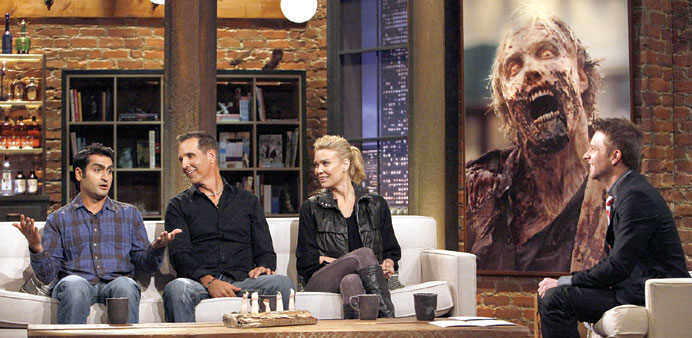By Greg Braxton
As the latest installment of zombie apocalypse, The Walking Dead, airs on a recent Sunday night, Chris Hardwick calmly sits in a slightly tacky living room set in a small studio at CBS Television City. He silently reviews his notes on his iPhone and strategically positions his interview cards as the crew bustles around him and a (human) audience waits quietly in nearby bleachers.
The episode ends with a major character in dire straits — Andrea (Laurie Holden) is shackled and bound in a torture chamber devised by her ex-lover, the evil Governor (David Morrissey). As the final credits roll, the lights come up in the studio and Hardwick’s somewhat incredulous expression is beamed live to the legions of Walking Dead viewers.
As the camera zooms in, Hardwick, wearing tennis shoes, a kaleidoscopic tie and a black jacket that looks a half-size too small, turns into Dead man, talking.
“Are you kidding me with that?” exclaims the 41-year-old comedian, host of AMC’s surprise hit zombie chat-fest The Talking Dead. “Andrea is being held captive in the chamber of horrors? What happens now?”
Broadcast directly after the phenomenally successful The Walking Dead, The Talking Dead took on a life of its own this season, evolving from a half-hour companion show into a full-fledged, hour-long monster mash whose ratings in the coveted 18-49 demographic surpass a host of prime-time shows on the major networks.
Armed with an unabashed geek love for the series, Hardwick gleefully dissects every bite and slice from each episode while also juggling a panel of celebrity guests — all either associated with or just fans of the mother show. Led by Hardwick, who also hosts BBC America’s cult favourite The Nerdist, the panel dives into Walking Dead trivia, behind-the-scenes featurettes, and fields questions from viewers both in-studio and via e-mail and phone calls.
“It’s like a post-game show for the Super Bowl,” said Brad Adgate, an analyst for New York-based ad firm Horizon Media. “This show has really capitalised on the power of social media. The Walking Dead is one of the most popular shows on Twitter and Facebook, and this devoted following has always elevated The Talking Dead.”
The March 24 episode of The Talking Dead averaged 4.5mn viewers, an increase of its weekly average of 3mn viewers. The midway point of the third season in February drew in 4.1mn viewers. Executives say about half of the audience for The Walking Dead, which just concluded its third season, stays tuned for The Talking Dead.
Joel Stillerman, AMC’s head of original programming, said he thought The Talking Dead would find its audience when it launched in the second season, “but I would be lying if I said I thought we would get these kinds of numbers. To see how it’s grown is really a testament to the show, and to Chris. There’s just this incredible energy surrounding the show in social media.”
Even more significantly, The Talking Dead is one of the least expensive series on AMC’s prime-time slate — the set is spare, there’s no band and the production is low-frills. While declining to say how much the show costs, Stillerman said “it’s a good business model. We get a nice return on our investment.”
Although rumours have circulated that AMC may take a companion-show approach to its other series such as Breaking Bad or Mad Men, Stillerman said nothing immediate is in the works.
The foundation of The Talking Dead, of course, is conversation, which flows from a loose talk-show format. It isn’t hard to book popular guests — in addition to Holden, other visitors include Robert Kirkman, who created the comic book series on which the show is based, and other writers, rocker Dave Navarro, writer-director Kevin Smith and comedian Patton Oswalt.
The only requirement for guests is that they be genuine fans of the graphic novel or the show — The Talking Dead is not the place for celebrities to hype their latest project. For instance, Aisha Tyler, who co-hosts the daily syndicated The Talk and is one of the voices on FX’s animated comedy Archer, did not mention those shows on her recent appearance.
The show’s conversations range from plot point to character motivation. Earlier this month Holden explained to Hardwick why it would have been morally difficult for her character to commit the cold-blooded murder of the Governor.
Another weekly highlight is the show’s “in memoriam” segment, which pays tribute to those characters — particularly zombies or “walkers” — who met a bloody fatal end during the episode. A recent episode saluted the “tree-hugging walker” and “hippie chick walkers.”
The show’s success has lifted Hardwick, who has turned his geekdom into a cottage industry: He is the founder of Nerdist Industries, a pop-culture/nerd empire that includes a website, a YouTube channel, pod cast and a comedy-variety show that airs on BBC America.
“Not every show needs an after-show,” Hardwick said in an interview. “But The Walking Dead is just one of those shows where you really need to talk about it after it’s over. I wish there could have been a show like this after Lost.”
He approaches his Talking Dead duties like a true fan. He’ll watch The Walking Dead episode to be discussed the night before the show and purposefully avoids getting too far ahead of the audience.
“I want my enthusiasm to be genuine,” he said. “I don’t want to know anything that is coming up. Ideally, I want this show to be a big hug before going to bed.” — Los Angeles Times/MCT

